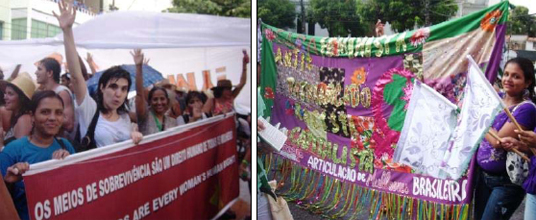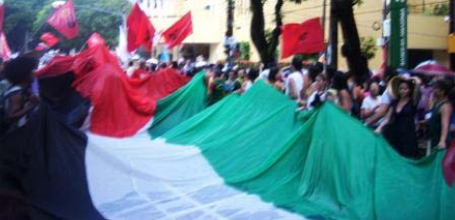| |
|
The World Social Forum (WSF) took place in Belem (state of
Para, Brazil) from January 27 to February 1, 2009, to deliberate
on hundreds of self-organized activities, proposed by civil
society organizations from the world over.
To view the overall report on WSF Belem Click here
|
| |
|
PWESCR Events at the WSF, Belem, January 2009 |
|
PWESCR, in collaboration with a host of other organisations working on women and livelihoods as part of the Gender Equality Coalition of the Human Dignity and Human rights Caucus, organised a series of events recently at the World Social Forum (WSF), January 2009. |
 |
|
A. Women's Right to Livelihoods: Addressing Development and Displacement
PWESCR, in collaboration with Habitat International Coalition (HIC), organised this lively event, with input on diverse issues of livelihoods and the ways in which development and displacement have violated women’s rights to livelihoods. A broad picture of women and the right to livelihoods emerged from the discussion, closely connected to the right to a dignified life. Speakers captured the essence in different ways, whether in terms of self-sufficiency, the means of production or life itself, but Lanh (Vietnam) captured it powerfully in her opening, “Livelihood is every human right. This concept is in our heart, it is a culture, it is land and it is the environment. It is the basics of our human existence.”
What is clear is that Livelihoods for Women is not a new issue, it is about issues women have been mobilising around for decades - land, water, forests, indigenous peoples’ rights, climate change, displacement etc. However there is a pressing need for focus on livelihoods as a right in the context of the deepening crisis of capitalism and its dramatic impact on livelihood related rights for women around the world. Viewing the different aspects as part of a greater issue and addressing them in a more holistic way has tremendous power. The elements speakers focused on can be grouped into three areas:
(1) The right to food, agriculture, food security and food sovereignty
(2) Natural resources: Land, Water and Forests
(3) Education, skills, work, markets and credits
Issues concerning feminization of poverty, trade liberalisation, MNCs and migration cut across all three areas |
 |
|
B. Women's Right to Livelihoods: Building a Collective Agenda
This event provided a space for participants to exchange and dialogue on issues core to women and livelihoods and to develop a collective strategy to work at various levels to strengthen efforts for change. The proposals put forward will drive the new Global Network on Women and the Right to Livelihoods.
Diverse strategies were discussed, exploring national, regional and international possibilities. All groups called for more and better networks at all levels for organizing, capacity building, strategizing and mobilization - as critical to any change. The message is loud and clear: we need to unite, to strengthen our own capacities, to refine joint strategies and to engage with political structures to press governments to fulfill their responsibilities to their people rather than fill their pockets with Multi-National Corporations (MNCs). This must happen collectively at the national and global level, targeting states, relevant UN bodies and global financial structures (WTO and World Bank). We need to develop and advocate for sustainable alternative development models, with women at the centre, and engage with United Nations structures to better represent women’s struggles for livelihoods |
 |
|
C. Launch of the Global Network on Women and the Right to Livelihoods
Finally, the Global Network on Women and the Right to Livelihoods was launched on the last evening of the Forum. This was an exciting moment, and the culmination of many months of discussion and engagement by an increasing number of individuals and organisations. However this took place in awareness of the reality of the depth of the struggles that threaten women’s livelihoods around the world. So it was also a grounding moment, which recognised the need for solidarity and joint strategies, working from the local to the global level and making women’s right to livelihoods visible and alive within the debates and action on the current global crises.
For full report, please See Here |

|
|
LATEST NEW UPDATES
ON WSF 2009 |
|
Members of the Gender Equality Coalition of the Human Dignity and Human rights Caucus recently held an evaluation meeting of WSF – See Here for what they thought.Email us your thoughts! |
| |
Preperations of WSF 2009 |
|
In preparation for the forum, PWESCR (India) and Equal in Rights
(Netherlands) have taken the responsibility within the Caucus of
Human Dignity and Human Rights to mobilize a sub-group focused
on Women's Equality Struggles and Human Rights. So far, more
than 75 organizations and individuals have come together to
share their ideas and plans for the WSF.
PWESCR organized Four Skype conference with national and
international organizations and individuals working on Human
Dignity and Human Right Caucus to share their plans and ideas.
Given below are the minutes of Skype chat meetings. |
|
|

|
|
WHAT IS WORLD SOCIAL FORUM ? |
|
The World Social Forum is an open space where social movements,
networks, NGOs and other civil society organizations opposed to
neo-liberalism and a world dominated by capital or by any form
of imperialism come together to pursue their thinking, to
exchange ideas, to formulate proposals, share their experiences
and network for effective action.
The first three meetings, as well as the fifth, were held in
Alegre (state of Rio Grande do Sul, Brazil), in 2001, 2002, 2003
and 2005.The global event was organized for the first time
outside Brazil, in India, in 2004.
The WSF was decentralized in 2006 and was held in three
countries in different continents: Mali (Africa), Pakistan
(Asia) and Venezuela (Americas). It returned to a centralized
format in 2007 and was held in Kenya (Africa). |
|
Read more... |
|
What are Human Dignity and Human
Rights Caucus about ? |
|
The Caucus is a group of human rights and development-related
organizations that, over the past few World Social Forums, have
come together to contribute to the coordination and visibility
of human rights activities. More than 80 organizations were
involved in the Caucus in the WSF in Nairobi 2007. Detailed
information on previous activities of the Caucus, as well as
about the organizations involved in Nairobi WSF 2007 and in the
2008 Global Action Day, is available on:
http://hdhrc.over-blog.com/
For the 2009 WSF, the Caucus is focusing on facilitating
alliance building, stimulating new linkages among diverse actors
and hosting a human rights space as well as advancing core Human
Rights themes. The Caucus will not organize any specific
activity on its own. It will concentrate on the following
themes: |
-
Human rights and struggles for social and economic justice
-
Human rights and struggles for women’s equality
-
Human rights and struggles over habitat, land and environment
-
Human rights, mobility and citizenship gap
-
Human rights and conflict, militarization and culture of
impunity
-
Human rights and faith and cultural diversity
|
| |
|
Core organizing
group are – HIC, ICCO, FIDH, FIAN, LWF, Equal in rights,
PWESCR. |

|
|
Organizations |
| AWEPON (African Women's
Economic Policy |
WDACA (Women Development
Initiative) |
| Network), Uganda |
CENSURED (Centre for Human
Rights, Democratization and |
| GROOTS Kenya |
Development), Cameroon |
| Ebony Youth and Orphans
Support Initiative, Kenya |
Network Women and Youth in the
Rural Population in Haiti |
| Tamil Nadu Women's Forum,
India |
Ministry of Education,
Vanuatu, Vanuatu |
| Interagency Gender Forum
Afghanistan, Afghanistan |
International Museum of Women,
Mongolia |
| Sahayatri, Nepal |
Iranian women's Network
Association, USA |
| FEDO Nepal, |
Federation of Women Lawyers
Kenya, Kenya |
| Feminist Dalit organisation,
Nepal |
YWALM (Women African Leaders
Movement), Zimbabwe |
| WACOL (Women Aid Collective),
Nigeria |
The Women's Shadow Parliament,
Kenya |
| Colectivo Feminista Mujeres
Universitarias, Honduras |
JC International English
School, Nepal |
| Social Development Foundation,
India |
Rede Feminista de Saude,
Brazil |
| ANHAD, India |
Sathi Partership for All,
India |
| BRAC, Bangladesh |
Fundo Direitos Humanos, Brazil |
| Police Training School,
Cameroon |
National Organization for
Sustainable Development, India |
| SPERI (Social Policy Ecology
Research Institute), Vietnam |
Bangladesh Environmental
Institutional Strengthening Project (BEISP), Bangladesh |
| Movimiento Manuela Ramos, Peru |
Entrepreneurship Development
Institute of India, India |
| ECOT, Thailand |
American Council for Voluntary
International Action, USA
CREA, India |
| Shevolution, United Kingdom |
PHREB (Promoting Human Rights
and Education in Bangladesh), Bangladesh |
| Inter American Commission of
Women, Organization of American State, USA |
Rozaria Memorial Trust ,
United Kingdom |
| Center for Rebuilding
Sustainable Communities after Disasters, Boston |
Regional Association for
Engineer Women, Peru |
| The Sustainable Development
Foundation, Thailand |
Gender Justice & Diversity
Section, Bangladesh |
| CEPIA, Brazil |
Latin American and Caribbean
Women's Health Network (LACWHN), Chile |
| |
|
|
Individuals |
| |
|
| Nandita Shah, India |
Puja Kapai, Hongkong |
| Anita Mathew, India |
Damai Pakpahan, Indonesia |
| Marilia, Brazil |
Kritinne Sanz, ,United Kingdon |
| Marlene, ,Brazil |
Millena, Brazil |
| Soma KP, India |
Poonam Kathuria, India |
| Mamata Dash, ,India |
Dr. Parag Mankeekar, India |
| Larry Roeder |
Vernie Barnes |
| |
|
|
|
BELEM EXPANDED: ENLARGING PARTICIPATION IN THE WSF 2009
The WSF2009 Belem Expanded will open a new way of participation
for movements, entities and civil society organizations which
may not be able to attend the meet, but at the same time view
themselves as active participants in the WSF process. They
should try to be a part of the WSF by participating in Belem
Expanded—organize online activities, events in their countries
and link them to events in Belem using internet tools (such as
text and audio chats or video conferences), or using other
communication technologies (such as radio transmissions, letters
and others). |
|
Read more... |

|
|
USEFUL LINKS
Some brief information about the WSF 2009 is available on the
Brazilian World Social Forum website
http://www.fsm2009amazonia.org.br
along with details about past WSFs.
WSF Process – Calendar of Mobilisations
towards 2009
WSF 2009: Amazonia calls us to renew our commitment to another
possible world
Human Dignity and Human Rights Caucus Blog- Promoting Human
Rights in the WSF
http://hdhrc.over-blog.com
A D-group (e-discussion group) was formed for sharing
information and ideas even after the WSF. This D-group is a
discussion and planning space for organizations and people
working on gender equity and women’s rights, especially in
relation to the WSF. Those interested in discussing in these
topics, as well as individuals and organizations planning for
the WSF, can join the D-group. Link to the website for
subscription:
http://www.dgroups.org/groups/wsf-genderequity |

|
|
Home | About Us | Resources | Donation | Contact Us | Site map
Copyright 2008, All Rights Reserved. PWESCR. |
|








